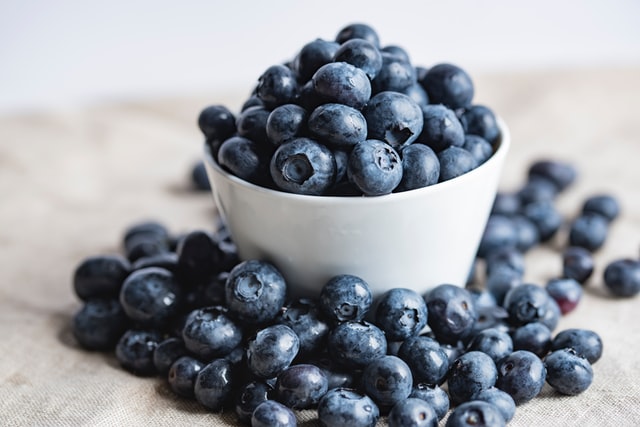This vibrant & colorful fruit may be tiny , but each serving packs a serious punch when it comes to nutrients & benefits. Blueberries remain as a long-standing member of the exclusive category of Superfoods due to its antioxidant and anti-inflammatory properties that have been shown to do wonders for our bodies from enhancing our brain health to keeping our heart strong. Plus, these fruits are also super sweet, tarty which blends in well with a number of dishes, especially pancakes amongst others.
Need any more convincing on why this tiny fruit should be added to your diet? Keep reading to learn more about the background facts and benefits of blueberries and why they are categorized as a superfood.
Table of Content
- What Are Blueberries
- How to Choose the Best Blueberries From the Local Market
- How Do Blueberries Taste Like In Recipe
What Are Blueberries
Blueberries are perennial flowering plants. Once blossomed, these blueberries can also be of another color such as purple! Blueberries belong to the genus Vaccinium, which also includes cranberries, bilberries, and huckleberries. Commercial blueberries – highly distributed in Europe, North America, and Asia – are typically from North America. These blueberries are categorized into 2 broad types – lowbush and highbush.
Wondering what’s the difference between lowbush and highbush blueberries? It all depends on the height upon which the blueberries shrubs are grown relative to the ground. The species with small, pea-sized berries growing on low-level bushes are known as “lowbush blueberries”, while the species with larger berries growing on taller cultivated bushes are known as “highbush blueberries”.
How to Choose the Best Blueberries From the Local Market
For Fresh Blueberries: When you purchase fresh blueberries from the local market, look for berries that are firm, dry, plump, and smooth-skinned, with a silvery surface bloom and no leaves or stems. The bloom is the natural protection of the berries. Take note that the size of the blueberries isn’t an indicator of maturity but the color is – berries should be deep purple-blue to blue-black.
A blueberry that is firm or shows any sign of redness isn’t fully ripened and will likely be tart. Never pick white or green colored blueberries as they are not ripe and they never might even if you bring them back home to leave them on the counter in your kitchen, hence leave them out!
For Frozen Blueberries: You can find pre-washed, unsweetened frozen blueberries packed in poly bags or boxes in most supermarket frozen food sections. Just take note that when you grab a bag of frozen blueberries, they should feel loose and not clumped together.
How Do Blueberries Taste Like In Recipe
Fresh blueberries have a slightly sweet taste that is mixed with a little bit of acid which could result in it being tarty. Some blueberries are tarter than others, while some are sweeter than the rest. Although small in size, blueberries are juicy and will release juices when you bite down. As the blueberries pop in your mouth, you will enjoy a burst of sweet juice even though not all are as juicy as other berries such as blackberries and raspberries. Unripe blueberries will generally be tart and can even be sour too. The taste of blueberries can often be associated with the taste of both red and green grapes. It is the combination of sweetness coming from red grapes and the tartness of green grapes that makes blueberries so delicious and addictive.
Favorite Blueberries Recipes
Due to its sweetness, blueberries can be added to just any dessert recipe to kick things up. Try them in pancakes or baked goods to ramp up the antioxidant content of your dish. You could also sprinkle them over oatmeal or yogurt to fully enjoy the dessert. Alternatively, you could also take full advantage of the many health benefits that blueberries provide by enjoying them as is – no other ingredients are required. Give a few of these blueberries recipes a try to get started:
- Blueberry Pancakes
- Blueberry & Oat Crumble
- Blueberry Smoothie
- Blueberry Frozen Yogurt
Top 7 Health Benefits of Blueberries
These blueberries may be tiny, but they’re packed with vitamins and minerals. These properties make them fit the superfoods definition to a T! Brimming with disease-fighting antioxidants, read on further to find out what other benefits blueberries bring to the table!
- High in Antioxidants
- Speed Up Weight Loss
- Help Fight Cancer
- Reduces Inflammation
- Boost Brain Health
- Promote Heart Health
- Support Digestion
1. High in Antioxidant
Antioxidants are compounds that fight harmful free radicals that could result in an array of health complications. They not only prevent cell damage but also protect against diseases like heart diseases, diabetes, and even cancer.
Blueberries are one of the best sources of antioxidants. Based on an ORAC score – an expression of antioxidant values provided by food – provided by research, blueberries rank second on the list among all ingredients, coming in at around 9000+ ORAC score. It is also found that blueberries also contain many specific types of antioxidants, including phenols, flavonoids, and anthocyanins.
Other top antioxidant foods include dark chocolate, goji berries, pecans, cilantro, and cinnamon.
2. Speed Up Weight Loss
A quick look at the sheer size of one blueberry and you would agree that it’s low in calories. But it doesn’t end there, this nutrient-packed berry provides a whole lot of fiber per cup, filling up to 14% of your daily needs with just one serving.
What’s with fiber? Fiber moves slowly through your digestive tract, promoting satiety and keeping you feeling full longer to aid in weight loss
Make sure you’d combine blueberries with a nutritious, well-rounded diet and plenty of physical activity to promote weight loss even more.
3. Help Fight Cancer
It’s shown that blueberries have some impressive ability to protect our bodies against certain types of cancer.
Blueberries have the ability to inhibit the growth and spread of breast cancer cells, making them potential cancer-fighting agents. It’s also shown that blueberry juice could reduce the growth of several types of cancer such as stomach, prostate, and breast cancer cells.
To optimize your cancer-fighting potential, I would suggest that you consume a variety of berries along with other fruits and vegetables.
4. Reduces Inflammation
Chronic inflammation is thought to contribute to a wide range of conditions, including cancer, heart diseases, and even depression.
Thanks to their anti-inflammatory & antioxidant properties, blueberries have been shown to alleviate inflammation in your body. The polyphenols found in blueberries extract help reduce the activity of inflammation markers.
To lower your inflammation levels further and fully, I’d suggest incorporating pineapples, papaya, chia seeds, and broccoli into your diet.
5. Boosts Brain Health
There have been many studies that suggest that eating blueberries could improve your memory and cognitive ability.
This could be because of the presence of antioxidants such as flavonoids, which protect the brain from free radical damage and promote healthy brain aging. Blueberries also contain a vast amount of vitamins and minerals such as Vitamin C, Vitamin K, and gallic acid which all protect the brain from degeneration and stress.
Conversely, consuming more of the brain foods – avocados, walnuts & salmon – can help enhance memory and focus!
6. Promotes Heart Health
There’s no doubt that the heart is one of the most important components of our system. Responsible for pumping blood through the body to provide tissues with oxygen and nutrients needed to survive and thrive, it’s important that it’s kept in well shape.
Unfortunately, coronary heart disease is one of the leading causes of death in the world right now. High triglycerides, elevated bad cholesterol, and increased blood pressure are just a few of the main factors for heart disease that put a strain on your heart and force it to work harder.
So what can you do about it? Lucky for us, blueberries have been shown to reduce some of the risk factors for heart diseases. Eating blueberries can help to lower blood pressure and reduce oxidized LDL cholesterol levels, two of the major risk factors for heart diseases.
7. Support Digestion
Blueberries could also help meet your daily fiber needs and promote regularity and healthy digestion.
Once the fiber has entered your digestive system, it travels through undigested, adding bulk to your stool to keep you regular. Increasing your fiber intake can not only increase your stool frequency in those with constipation but could also reduce cholesterol levels.
Consume more blueberries along with drinking more water and eating more fiber-rich foods like bok choy, broccoli, and legumes to keep your digestive system working more efficiently!
How to Store Blueberries
When you get your blueberries home, do not expose them to the sun or heat in closed bags or containers. Blueberries are fragile and prolonged exposure to heat would only shorten their storage lifespan.
In addition, do not wash them before freezing or putting them into the fridge. Washing blueberries prematurely makes them mushy, hence just normal inspection of blueberries by removing any mold will keep one from spoiling the whole batch!
Refrigerate the blueberries as soon as possible once you brought them home! Pack the blueberries in their closed plastic clamshell containers or place them loosely in shallow containers then cover them up with plastic wrap or cling wrap. To freeze them, simply transfer them from the plastic containers to airtight containers or heavy-duty storage bags and return them to the freezer.
Remember that fresh blueberries can be kept for up to two weeks in ideal conditions, if refrigerated. Frozen high-quality blueberries can last up to 11-12 months if stored properly!
Risks and Side Effects
Generally speaking, blueberries are safe to be consumed with minimal side effects.
However, some people may be allergic to blueberries. If that’s the case, do switch out the fruit with other fruits that are high in vitamin K and other nutrients that you are looking for.
Those who are on blood-thinning medication may have to consume blueberries in moderation as they are generally high in Vitamin K, which can interact with your medication.
In Conclusion
Blueberries may be small but do not cast them aside! These tiny berries are known as “superfood” for a reason. Low in calories, blueberries are loaded with antioxidants, fiber, vitamin K & C among many other important micronutrients. These nutrients contribute to the health benefits that blueberries are fame for., including improved heart and brain health, protection from cancer and reduced inflammation.
Blueberries can easily be incorporated into any dessert recipes to add a touch of sweetness, but do opt for organic, fresh blueberries whenever possible to reduce any exposure to herbicides!
Lastly, blueberries are sweet. They are tangy. They are juicy. But most importantly, they are extremely nutritious! Hence, I don’t see why we should not include them to our daily diet plans! Grab them quick during your next grocery shopping!

